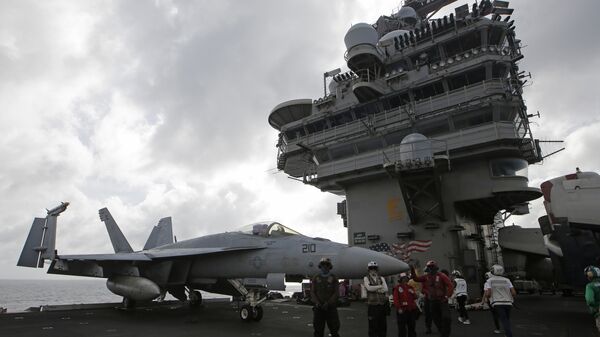China has refuted US Defense Secretary Mark Esper’s recent claim that it was destabilising the Indo-Pacific region, dismissing the remarks as irresponsible blame shifting, and reiterated the purely defensive nature of Beijing’s military development.
Answering reporters' questions, Chinese Foreign Ministry spokesperson Hua Chunying said that for a long time, the US has been grossly meddling in the affairs of Asia Pacific countries, attempting to drive a wedge between them by promoting so-called "Indo-Pacific strategy" while enhancing military deployment and strengthening military alliances in the region.
"It's crystal clear who is undermining regional stability in the Asia-Pacific region," said Hua.
The spokeswoman stressed that the US had long been using China as an excuse for its decisions regarding the Intermediate-Range Nuclear Forces Treaty (INF) and other issues, distorting facts in order to hype up "China's missile threat".
Despite strong international opposition, said Hua, the US withdrew from the INF Treaty and is now hastily seeking to deploy intermediate-range missiles in Asia.
"This in fact reveals the real intention of the US withdrawal from the treaty," said Hua. China pursues a defensive military policy, said Hua, adding:
"We develop military power out of self-defence purpose. We do not intend to and will not pose a threat to any country. All of China's land-based short- and intermediate-range missiles are deployed within our territory, which testifies to the defensive nature of our defence policy. However, if the United States deploys intermediate-range missiles in Asia-Pacific, especially around China, its aim will apparently be offensive," said the spokeswoman.
She emphasised that if the US insists on going ahead with these plans, international and regional security will be severely undermined.
"China will not just sit idly by and watch our interests being compromised. What's more, we will not allow any country to stir up troubles at our doorstep. We will take all necessary measures to safeguard national security interests," said Hua.
The spokeswoman’s words echoed the statement by Fu Cong, the director of arms control at the Chinese foreign ministry, who earlier stated that China would be forced to take countermeasures should the US deploy intermediate-range ground-based missiles in the region.
He also advised other nations, particularly South Korea, Japan and Australia, to "exercise prudence" and not allow the US to deploy such weapons on their territory, saying that would "not serve the national security interests of these countries".
Pentagon Mulls Deploying Intermediate-Range Missiles in Asia After INF Treaty Collapse
On Saturday the US Defense Secretary Mark Esper said he was in favour of deploying ground-launched, intermediate-range missiles in Asia within months.
"We would like to deploy a capability sooner rather than later", Esper told reporters at the start of his tour of the Asia-Pacific region, without specifying the destination of the weapons.
Australia’s defence minister has already stated her country will not be used as a base for the missiles.
Washington officially withdrew from the Intermediate-range Nuclear Forces (INF) Treaty on 2 August.
In February, the US announced it would be suspending its obligations under the INF Treaty if Russia refused to resume compliance with the accord's provisions, claiming the country had violated it by developing the 9M729 missile. Moscow denied the allegations, noting that US defence systems placed in Europe are equipped with launchers capable of firing cruise missiles at ranges prohibited under the treaty.
The INF Treaty, signed in 1987, required the two countries to eliminate and permanently forswear all of their ground-launched ballistic and cruise missiles with ranges of 500 to 5,500 kilometres (310 to 3,417 miles).


